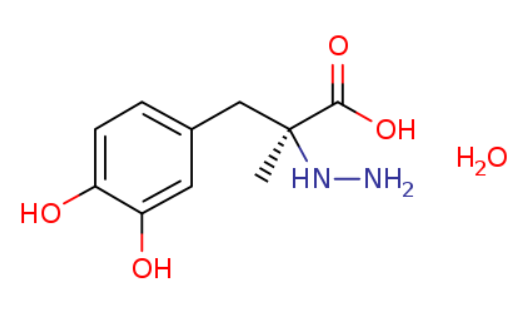Grade: Pharmaceutical Grade
Factory Location: Xiamen, Fujian
Main Sales Markets: North America,Central/South America,Western Europe,Eastern Europe,Australasia,Asia,Middle East
Monthly Production Capacity: 1000kg
Packaging Information: 25kg/drum 1kg/bottle
Delivery Lead Time: 7 days after payment
Sample Provided: yes
Payment Terms: L/L
|
Product Information |
|
Product name |
Carbidopa monohydrate |
|
Alias |
Benzenepropanoicacid, a-hydrazino-3,4-dihydroxy-a-methyl-, monohydrate, (S)-;Benzenepropanoic acid, a-hydrazino-3,4-dihydroxy-a-methyl-, monohydrate, (aS)- (9CI); |
|
CAS No. |
38821-49-7 |
|
Molecular Formula |
C10H14N2O4*H2O |
|
Molecular Weight |
244.247 |
|
Molecular Structure |
 |
|
Quality Standard |
98% up by HPLC |
|
Appearance |
White to creamy white powder |
|
COA |
|
ANALYSIS |
SPECIFICATION |
RESULTS |
|
Appearance |
White to creamy white powder |
Conform |
|
Solubility |
Slightly soluble in water, freely soluble in 3 N hydrochloric acid, slightly soluble in methanol, practically insoluble in alcohol, in acetone, in chloroform, and in ether. |
Conform |
|
Identification |
IR: The spectrum of sample corresponds to that of the ref. standard. |
Conform |
|
HPLC: The retention time of sample of main peaks corresponds to that of the ref. standard. |
Complies |
|
|
Specific rotation |
-21°~ -23.5° |
-21.8° |
|
Loss on drying |
6.9% ~ 7.9% |
7.2% |
|
Residue on ignition |
≤ 0.1% |
0.05% |
|
Heavy metals |
≤ 0.001% |
< 0.001% |
|
Methyldopa |
≤0.5% |
0.1% |
|
Carbidopa related compound A |
≤0.5% |
Negative |
|
Any other impurity |
≤0.1% |
0.01% |
|
Total impurities |
≤1.0% |
0.13% |
|
Residual solvents |
Should conform |
Conform |
|
Assay |
98.0% - 102.0% |
99.6% |
|
Conclusion |
The results above meet the requirements of USP39 |
|
|
Usage |
What is Carbidopa?
Parkinson’s disease is a degenerative condition that affects the central nervous system and causes difficulties controlling movements and impairs muscle function. It is thought to perhaps be the result of abnormally low levels of dopamine, a chemical in the brain that is responsible for a variety of functions, including controlling the body’s movement. The medication is typically only effective at treating Parkinson’s disease when it is combined with another drug known as levodopa. Carbidopa is a medication that is primarily used in treating the symptoms of Parkinson’s disease.
Levodopa and carbidopa usually work together at treating the symptoms of Parkinson’s disease in a process. Since Parkinson’s disease is thought to be the result of low levels of dopamine, levodopa may help decrease Parkinson’s disease symptoms, such as tremors, stiffness, and muscle spasms, by increasing the amounts of dopamine in the body. When levopoda is taken, it turns into dopamine; however, the medication risks being metabolized by the body in the bloodstream before it can reach the brain as dopamine and effectively treat Parkinson’s disease symptoms. Carbidopa may help slow down the metabolizing of levopoda so that it has time to be released as dopamine in the brain, rather than being absorbed into the bloodstream.



